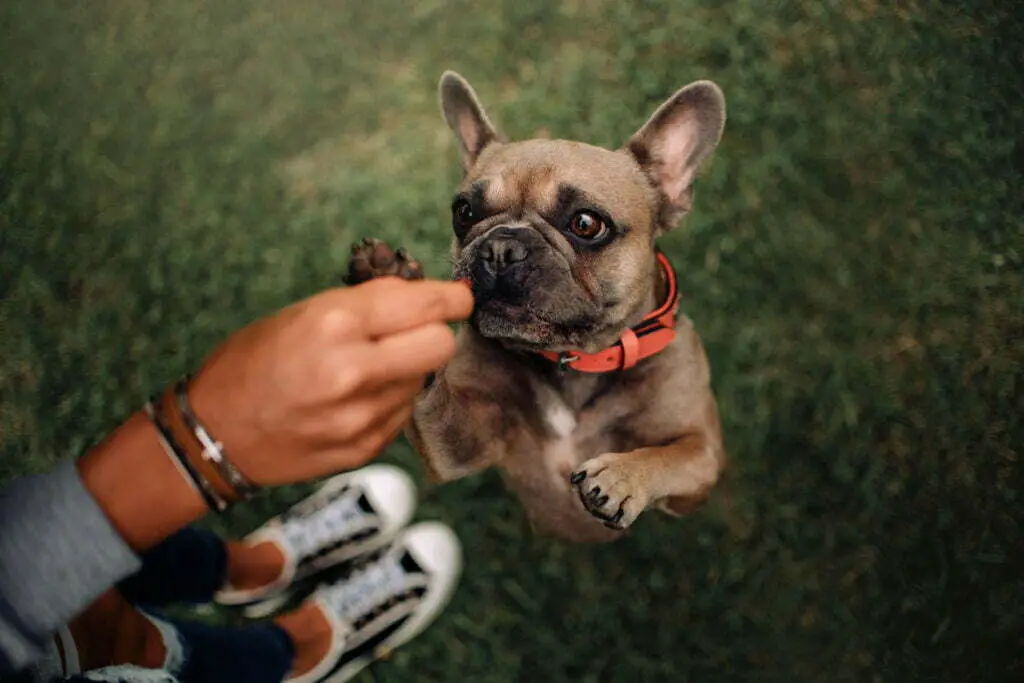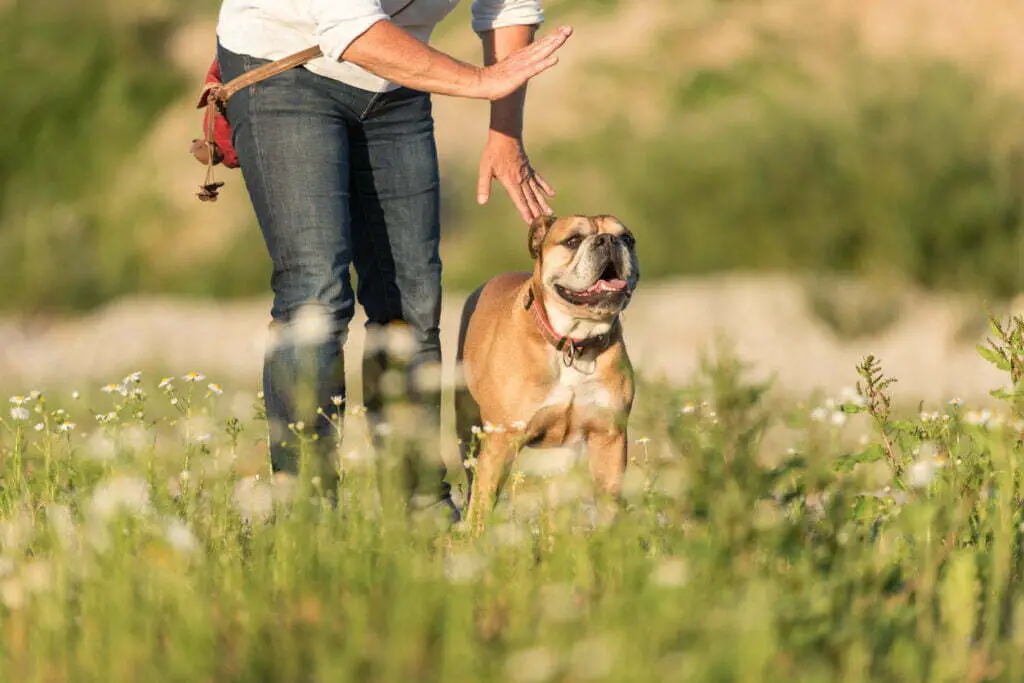French Bulldogs are popular due to their adorable looks and happy-go-lucky personalities. These dogs have become very popular for a good reason. However, their one complaint may be their barking.
French Bulldogs bark for various reasons, such as boredom, anxiety, protection, or even as a way of communicating with their owners. Barking can sometimes be a necessity, such as signaling to go to the bathroom. However, barking can quickly become a nuisance if not properly addressed.
It is important for French Bulldog owners to learn how to teach their dogs to stop barking to prevent potential conflicts with neighbors. And if not for your neighbors, for your own sanity.
Keep reading to learn tips on how to get your french bulldog to stop barking excessively.
Understanding Your French Bulldog’s Barking
In order to get your French Bulldog to stop barking excessively, you first need to figure out what triggers your dog to bark.
The best way to do this is by observing your Frenchie. It might be time-consuming, but the payoff, in the end, could be huge. You will need to watch your Frenchie whenever they are barking to see what they are barking at and take note of it.
If your Frenchie likes to look out the window and bark, make sure to take note of what in particular he is barking at. You may notice only certain things are triggering your dog to bark. It may be your perception that your dog barks at everything. However, this is not true. Your Frenchie may only bark when seeing people walk by, or maybe children or bike riders.
By watching and writing what exactly your French Bulldog barks at, you will start to see a pattern of what stimulates him/her. Once you identify what triggers your French Bulldog to bark, you will be able to begin the training process.
One of the questions I get asked the most on this website is: how can I teach my Frenchie to stop barking? The answer is quite simple. Teach them that being quiet is more beneficial to them than barking.

You may see minor results if you only correct your dog when they are barking. However, rewarding them when they are quiet will get far better results that are more long-term.
Research shows that 86% of dogs who were “punished” with a water gun while barking at a fence, and after three months, they just started barking again. Other research shows that when good behavior (meaning not barking) is rewarded with something the dog enjoys (like a treat), after 90 days, only 4% start to bark again.
Training Techniques
Next, we’ll talk about some of the top training techniques that you can use to stop your French Bulldog from barking excessively and fix their barking problem.
Positive Reinforcement
It is important to incentivize your Frenchie to be quiet. Giving your Frenchie treats when he is being quiet during a stimulating time is a great training tool. A lot of dogs are food motivated, and it is important to have your dog’s favorite tasty treat on hand.
When your French Bulldog is barking, it is important to ignore this behavior and reward them with treats and praise when they are quiet. We often raise our voices to tell our dogs to stop barking. However, this is more stimulating for them, and they will be more likely to bark.
Dogs who are praised for being quiet will be likely to repeat this behavior. Dogs love to be praised by their owners with pets, scratches, verbal praise, and treats. You can’t go wrong with any or all of these forms of positive reinforcement mentioned to encourage good behavior.

Negative Reinforcement
Using a spray bottle to interrupt barking
Negative reinforcement is a training method that involves using an adverse stimulus, such as a bark collar or a spray bottle, to decrease a specific behavior.
To stop a French Bulldog from barking using negative reinforcement, you need to first identify the trigger for the barking. As previously mentioned, it is important to tailor your training around your dog’s specific triggers.
Triggers could include the doorbell ringing or someone knocking on the door. Once the trigger is identified, you can use the spray bottle or bark collar to provide an unpleasant stimulus to the dog when they start to bark.
For example, if you are using a spray bottle, you can spray a mist of water in the dog’s face when they start to bark. If you are using a bark collar, the collar will emit a loud noise or a mild electric shock when the dog barks.
It is important to note that the use of negative reinforcement should always be done under the guidance of a professional dog trainer or behaviorist to ensure that it is used correctly and does not cause any harm to the dog.
Using a bark collar to interrupt barking
If you choose to use a shock collar, it is very important to test it on yourself first and always start with the lowest setting. If you are in pain from the shock, you should not use that setting on a dog.
Some dog trainers find bark collars a very effective and safe training method if used correctly. However, there are also trainers who believe differently.
As a Frenchie parent, it is up to you to decide if you would like to try this method. I would advise starting with using positive reinforcement before trying negative reinforcement techniques.
Teaching “Quiet” Command
Consistency and repetition when teaching command
To teach your dog a “quiet” command, it is very important to be consistent. Your Frenchie’s natural instinct is to bark. However, your dog can be trained to bark excessively. But the good news is that you can also train your dog to stop barking.
Dogs respond very well to hand signals. An Italian Study found that dogs respond to hand signals with 99% accuracy. Whereas they only respond to verbal commands with 82% accuracy. This study shows that implementing hand signals in your training is very important.
Whether using positive or negative reinforcement techniques, you can use a hand signal to teach the quiet command.
For example, if your dog is barking and stops, you can use your hand signal while giving praise/treats for not barking. Eventually, your French bulldog will bark, and you can just use the hand signal. Your Frenchie will associate being quiet with that hand signal and stop barking.
You can do the same thing with the negative reinforcement by using the hand signal while your Frenchie is getting the adverse stimuli. Your dog will then associate the hand signal with the negative stimuli, and they will be incentivized not to bark once seeing the hand signal.

Providing rewards for following commands
Frenchies will repeat the behaviors that are rewarded. You may inadvertently be rewarding your dog’s barking when you acknowledge them while barking. They may not realize when you are talking to them or yelling that their behavior is unwanted.
So instead of giving them attention when they are barking excessively, it is important only to acknowledge your Frenchie when they are being quiet.
Frenchies love treats and lots of love, so it won’t be hard to know how to reward them for good behavior.
Redirection
When your French Bulldog is overly stimulated, getting them to focus and stop barking may be very difficult. Redirection can be very helpful in getting them to stop barking and hyper-focusing on what is making them bark.
For example, if your dog barks at the doorbell. You can train your dog to go to its bed instead of running towards the door. This will give them positive behavior to focus on instead of barking.
You can also provide your dog with interactive toys or puzzles to keep them mentally stimulated when they are alone, which can also help reduce excessive barking.
It is important to note that training with patience and consistency is crucial. Never scold or punish your dog for barking, as it can make the situation worse.
There are many activities that can help distract your Frenchie.
Keeping your French Bulldog engaged in mentally stimulating activities
French Bulldogs may bark when they are stimulated or bored. By keeping them mentally stimulated, you can avoid excessive barking. There are many ways to keep your Frenchie mentally stimulated
Exercise is an excellent distraction for dogs, and it is a healthy distraction. Whether taking them on walks or playing fetch, there are many ways to keep your Frenchie physically active.
French Bulldogs are very unique dogs that seem to pick up all sorts of activities. For example, skateboarding, surfing, soccer, and tetherball. French Bulldogs are such active dogs who love playing games and doing activities with their owners.
Allowing your Frenchie the opportunity to play and giving them different activities will help them to keep their minds stimulated.
Managing Your French Bulldog’s Environment
Providing a comfortable, safe, and secure environment
French Bulldogs bark when they feel like there is a lot of chaos in their environment. It is important to provide a safe and secure environment whenever possible.
Dogs, like people, need routine, and when their routines are disturbed, they become anxious, which they will express by barking excessively.
Establishing a routine for your French Bulldog
We established that having a routine with your French Bulldog is important, but you may be wondering what your routine should consist of. Feeding your Frenchie at the same time and staying consistent with walks or play time are important things to keep on a schedule.
Your dog will not only feel comfortable when they know what to expect in the day. Having scheduled walks are also important for exercise and mental stimulation.
Providing plenty of exercise and mental stimulation
Like any dog, Frenchies will learn to do what the owner does. If the owner sits around most of the day, then your French Bulldog will be more likely to do the same thing.
French Bulldogs are not hyper dogs, but they do like to play and are fun-loving dogs. Keeping your Frenchie mentally stimulated is very important.
If you live in an apartment, you can take your Frenchie to the dog park to expend excess energy. If you have a house with a backyard, then you can place a soccer ball in your yard, and I bet your Frenchie will stay busy playing with the ball for hours.
No matter where you live, you and your Frenchie can go on walks together and find many activities to keep them stimulated.

Conclusion
In conclusion, French Bulldogs are popular due to their cute appearance and friendly personalities, but their barking can become a problem if not properly addressed.
Understanding what triggers your French Bulldog to bark is the first step in correcting this behavior.
Positive reinforcement, like rewarding quiet behavior with treats, is a more effective long-term solution compared to punishment.
Training techniques, such as using a spray bottle or bark collar with negative reinforcement, should always be done under the guidance of a professional.
Each dog is unique, and what works for one may not work for another, so it’s important to observe and understand your French Bulldog’s specific triggers and find the best training technique that works for you and your furry friend.
It is important to be consistent with training and to be patient with your Frenchie. Just remember that your Frenchie does want to please you and that they are trainable.
Having a well-trained, quiet French Bulldog is achievable and now you have great tips to get you started!
Frequently Asked Questions
Why do French Bulldogs bark?
French Bulldogs bark for various reasons, such as boredom, anxiety, protection, or even as a way of communicating with their owners.
Why is it important to stop French Bulldogs from excessive barking?
Excessive barking from French Bulldogs can lead to conflicts with neighbors and can also be a nuisance for the owners. It is important for French Bulldog owners to address this issue.
What is positive reinforcement in dog training?
Positive reinforcement involves incentivizing the dog with rewards like treats, praise, and affection for good behavior, such as being quiet. This is a powerful training tool for French Bulldogs.
What is negative reinforcement in dog training?
Negative reinforcement involves using an adverse stimulus like a bark collar or a spray bottle to decrease a specific behavior. This technique should always be done under the guidance of a professional dog trainer or behaviorist.
